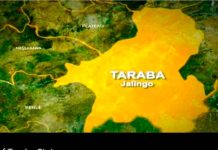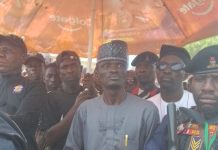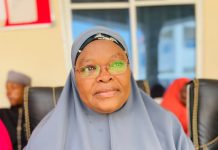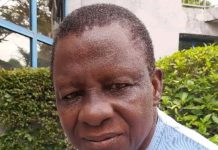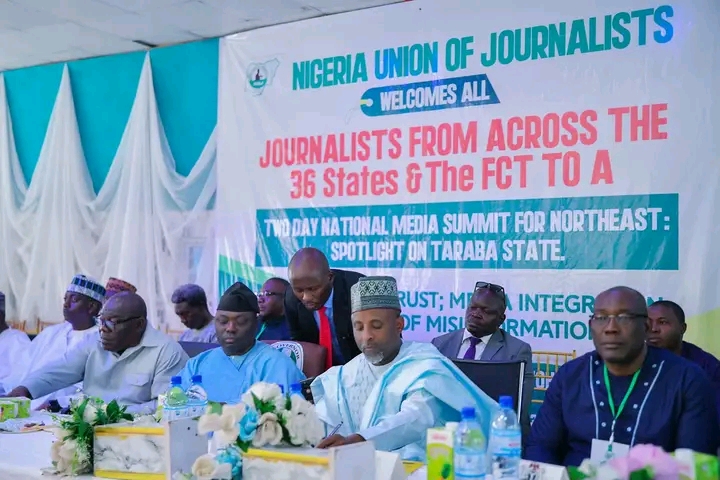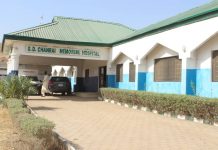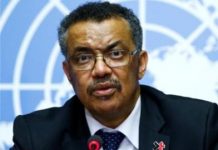Alhaji Aminu Jauro Hassan is the Pioneer Executive Secretary of the Taraba State Primary Health Care Development Agency. Hassan is one of the most popular personalities in the state’s health sector. He has brought his wealth of experience, intellectual savvy and ingenious professionalism to bear on the fortunes of the agency. He has nurtured and repositioned the agency into one of the country’s most potent primary health care delivery platforms, using his administrative charisma and professional creativity as a tool. This, he did not do by happenstance; he has a wealth of knowledge and experience as his support base.
Jauro Hassan has a background in Public Health, which he started at the lower lungs of the ladder as the Community Health Care Assistant, from where he rose to the level of Health Economist. He has a B.Sc. in Community Health where he capped it up with a 34 year working experience in the Primary Health Care environment.
Alhaji Jauro obtained his primary education in Jalingo and his secondary school education at Yelwa Government Secondary School in Yola, before proceeding to the famous ABU Zaria for his Community Health education. From there, he came to Federal University of Technology Yola (FUTY) where he read Health Administration and again to MAUTECH to read Bsc in Community Health. From there, the Community Health professional went to Taraba State University, where he obtained MSC in Health Economics. Aside these, he has attended national and international courses, obtained many certificates, among which is International Certificate in Decentralization from the Harvard University in the United States of America, International Certificate on performance Based Financing (PBF) and Sinna Health International from Kenya, among others.
In this interview with our reporters in the office, Alhaji Aminu Jauro Hassan spoke on the innovations in the agency, Government’s support as well as its challenges.
He has the love of the agency flowing in his veins. “I’m satisfied with the impact of our services, but we are not there yet”. He told our reporters. But what is the Taraba State Primary Health Care Development Agency of his dream? “I will like to leave a State Primary Health Care Development Agency that has a solid foundation and then a workforce that will stand the test of time by providing integrated primary health care delivery that will translate into reduction of maternal mobility and mortality in the state…, reducing out of pocket expenses to the common man so that he can just but by the door of his house, access services at a minimal cost.” He said. With what the Executive Secretary is putting in place, there is hope that he will get there.
Alhaji Jauro Hassan is married, a marriage that is blessed with children.
Enjoy, as you peruse through the full text of the interview.
As a pioneer leader of this agency in Taraba state, what have you done so far to actualize the mandate of this agency?
Let us look at it from the background of the creation of the State Primary Health Care Development Agency. Taraba State never had a functional or existing agency, not until the coming on board of the then Governor Sani Abubakar Danladi who stayed for just a while and subsequently, the coming on board of the present Governor of Taraba State, Arc. Darius Dickson Ishaku. Back then, I was the Director of Primary Health Care at the Bureau for Local Government and Chieftaincy Affairs. Governor Darius was the one who pushed for the establishment of the primary health care center. We felt that Taraba state was almost left behind so we pushed until it saw the light of the day and His Excellency keyed in.
I was appointed on the 23rd February 2015 as the pioneer Executive Secretary of the agency. We have been given the mandate to, reposition the agency as an agency of the government that is saddled with the responsibility of providing health care services to the entire people of Taraba state. Looking at the fact that health is generally divided into three: primary, secondary and tertiary health care and majority of the population lives in the rural areas. That is why the Primary Health care is given that responsibility to carter for these people. That is the general mandate of the agency. The agency has about 10 components, but they are summed up into 4: preventive services, curative services, rehabilitative services and promoting services. These are services that we render to ensure that we get across the whole state.
Now having that mandate, the responsibility now rest on my shoulder as Executive Secretary, to reposition the agency. To achieve this, I continue to liaise with the Head of Service, Civil Service Commission, Local Government Commission and indeed the Bureau for Local Government and Chieftaincy Affairs and the Secretary to the State Government to ensure that the essence which this agency is established is accomplished. It has not been easy; it has been a very difficult and demanding task. But we give glory to God because we have succeeded in repositioning the agency for the benefit of humanity. And indeed it has been made possible through the enabling environment that the Governor, His Excellency Arc. Darius Dickson Ishaku has given us. More to that, it is pertinent to mention that presently we have six functional departments in the agency which comprises of Department of Community Health, Department of Primary Health care, Department of Immunization and Disease Control, Health Plan Research and Statistics, and the Department of Admin and Finance which is been headed by the Director of Admin who doubles as the Secretary of the agency. We also have different program units which comprises of; maternal and child health, family planning, immunization and nutrition among others which all works for the attainment of the agency’s goal.
We are presently working to ensure that the agency is giving a list of life. What I mean is that, the agency has a budget line dedicated to the agency. This is because, in the first two years, we never had any budget allocation. We relied so much on our partners for support and funding, but subsequently, when our partners discovered that the agency has come of age, and it is fully repositioned, then the state government decided to give us a budget allocation. We have a subject and a head that is being used to provide these services across board and the areas of our services cut across the 16 LGAs having 168 wards and 1048 health facilities. But we have cut the number of health facilities through what is called “MSP” Minimum Service Package, considering the fact that , the more we allow more number of health facilities to exist, coupled with the fact that we have challenges with human resource for health, we will not be able to man or handle those resources adequately and provide quality health services and also because it is a national norm that all states should at least produce a working plan in line with the MSP which we did and subsequently the number of our health facilities dropped down to 168, that is one PHC functional per ward. This is because; we want to align with the policy of one PHC per ward, working 24 hours per day.
More to that, what we have achieved so far is repositioning the PHC. About 90 wards, out of the 168 are functional. Thank God, thanks to World Bank and indeed thanks to His Excellency the Governor of Taraba State for the conducive environment for the repositioning. These Primary Health Centers are working in collaboration with nine General Hospitals, so that cases that cannot be managed by these health care centers can be sent to the General Hospital for proper management after which they will be referred back to the Primary Health Care centers and we are also having international collaborations. That is how far we have gone.
Looking at these efforts and your service delivery initiatives, are you satisfied with the impact of the agency on the health needs of the people of Taraba State?
I will say I am satisfied, but we are not yet there. This is because if you look at the diversity of the state and the perception of some people at the national level, Taraba is like an orphan state. I say so because none of the partners wants to come to Taraba state due to the wrong impression given to them about the state. There is no part of the country that does not have its own problems peculiar to it. But in the case of Taraba, its own issues have been overblown to the extent that partners don’t want to come to the state.
Back to your question, deep within me I can say that I am satisfied due to what we put together but not completely because we are not yet there. We want to ensure that we keep a legacy and create an enabling environment so that people can know where to go and get their services and also reduce out of pocket expenses. For us to achieve that, we must do more. But I have to appreciate the fact that we have achieved a lot, looking at where we started. When I took over, the immunization coverage was below 16% but now we have recorded about 82% coverage of the state in terms of immunization. Immunization is just one aspect of it. I use immunization as the backbone of our service delivery which is free and efficient. Another example is the Hard to Reach Project. The Hard to Reach Project is an initiative of His Excellency Arch. Darius Dickson Ishaku in collaboration with the Canadian Government and the UNICEF. A quantum of money was set aside for partnership and collaboration with counterparts coming from the state and indeed the state base line survey was conducted across the state, whereby it was realized that we have about 650 hard to reach ends. I believe you understand what we mean by hard to reach, but this goes beyond your imagination. Only one who has being there will appreciate what I am saying. These are people living behind riverine areas, mountain areas, behind thick forest and what have you, who have never received medical attention or seen health personnel before and their distance with health facilities is up to 30 – 40 kilometers, thus, accessing those facilities becomes a problem. So based on the initiative of the governor, these are the first strata of people that His Excellency is directing us to, and it may interest you to know that those services were delivered free of charge. We handled that project for a period of three years and it was a very successful one.
Not only that, we have changed the narratives of our approach toward providing integrated Primary Health care services across all the 16 LGAs through capacity building of our staff, training, among other activities and also providing them with all the necessary requirements although not 100% but at least maximally to the level that they will appreciate and will also give them the enabling environment to strive and provide those services. This is the reason why the patients in various hospitals have reduced because they trust our Primary Health Care centers. The environments are hospitable, the drugs are there, the diagnoses units are there and they have proper diagnoses and also the elements and effective and qualitative drugs are being administered to them. Through the Nigeria steady investment project, what we do is N-ship, as the name implies it is home based services that provides and allows the facilities to perform independently. We don’t even buy drugs for them. All we do is to allow them develop what we call a work plan. What this means is that, access your own facility, tell us what your problem is, I don’t have cotton wool, I don’t have seat, I don’t have BP apparatus, drugs, Stethoscope, chairs etc. You just send it to us, we look at it holistically, we will give you approval and money will be sent into your account, ensuring that the needful is done in collaboration with the ward development committee because there must be what we call community buy in and community linkage and that is why it has been very successful.
We have also given our health facilities the capacity to hire and fire. If you think you have shortage of human resources and you think you don’t have laboratory technicians, you don’t have midwives the staffs are not there, capture that in your plan and tell us how much you are going to pay them, we will give you the money to employ and you will keep on managing. When you go to our PHC’s you will find out that our staff are up and doing working 24hours a day to ensure that all is done and they are working in collaborating with the ward health development.
To what extent is the Taraba State government supporting the agency?
The Taraba State Government under the leadership of His Excellency Arc. Darius Dickson Ishaku as earlier stated has given us the enabling environment. Why do I say so? This is because if the governor had not given us such environment, those partners working here in Taraba state and particularly in the agency with us wouldn’t have worked with us. Because whenever there is an issue of health, it is expected that the government also will give its funding. So the Taraba state government has been consistent in releasing funds as at when due and on timely basis. He has personally attended to all our flag up ceremonies. That goes a long way to show his political will and commitment. He has been consistent in providing these funds and that is even the reason why all the partners have also keyed into ensure that funding to the agency does not seize. As I am speaking to you, the UNICEF is the major funder of the Primary Health Care Development Agency. Through UNICEF we have succeeded in providing so many interventions to the teaming populace of Taraba state which includes IMCF, ICCM, Maternal and Child Health, immunization nutrition activities and a host of other things. We could have achieved all these if His Excellency has not been forth coming. So the prominent and most of the majority partners in Taraba state are WHO, UNICEF, IPAS, the Challenge Initiative , CDC, Mario Stack and host of others.
And not only that, though also the State Ministry of Health which is the mother ministry that we are working under, we have what we call SOME, (saving one million lives) project which is also a World Bank project that also support in the area of reduction of malarial infection and increase uptake of family planning commodities, nutritional aspect and a host of other things. Through that collaboration, we have also succeeded in providing adequate services to the teaming populace of Taraba State. So we are fully repositioned to advance the cause of providing integrated healthcare to the teaming group for Taraba State by the grace of god and through the sole cooperation of his Excellency the executive governor of Taraba State
What are the challenges?
You see, we can’t say after all these successes that we don’t have challenges, we have. The first challenge we have faced as a state and as an agency is security, we have security challenge because there are some pockets of local governments and settlements that we are unable to reach because of the simple fact that there are a lot of security challenges in those areas. But be it as it may, we are trying all we could to collaborate with the security agencies and regional groups in those domains to ensure that at least we reach out with these very important services which are free. Then the second challenge has to do with human resource for health, skilled manpower. If you look at the number of years the state was created to date, many staffs that are technical have retired from service, and some have transferred their services to other organizations seeking for greener pastures. These vacuum that has been created has been a challenge to us because as I told you earlier, we have over one thousand health facilities but we have decided not to close all the facilities but to ensure that our emphasis is on one PCM per ward and this one PCM per ward requires the compliment of 9 trained staff per facility which comprises of midwifes, two midwives or four midwives, 6 Community Health Workers and what have you. But the fact that we do not have much, that poses a challenge to us. But we are trying to ensure that we make do with what is available and then ensure that there is proper distribution of these staff to ensure that we cater for our populace. But be that as it may, I want at this juncture, to appreciate His Excellency because just in the last one or two years, he gave waiver to nurses and he has also graciously extended that waiver to the State Primary Care Development Agency workers that are due for retirement to also work for the next two years.
Their retirement will not be stopped; they will also be allowed three years so as to enable them to mentor those that will be coming on board. Because he has given us an administrative approval to employ so that will help us to bridge that gap. That is also another factor. Then another factor has to do with office accommodation but to God be the glory this is where we are today though we are occupying an office that belongs to TACA but at least we are okay and we are looking forward to having our own office accommodation one day. Then another aspect of challenge is for people to understand exactly what are our mandate, what is expected of us and what is expected of them is also a challenge. What I mean is community linkage and collaboration. Then we are also working assiduously to ensure that community take ownership. It is one thing for the government to construct to renovate, to provide but the maintenance and to ensure that those facilities are judiciously put to use is vested on the community because the government will not do it alone, we need to collaborate and we need the community to also support whatever the government is doing for the benefit of all of us.
As a pioneer leader of this agency what is your dream, what kind of Taraba Primary Health Care Agency would you like to leave behind?
I will like to leave a State Primary Health Care Development Agency that has a solid foundation and then a workforce that will stand the test of time of providing integrated primary health care delivery that will translate into reduction of maternal mobility and mortality in the state. That is exactly what I will like to see and by implication also reducing out of pocket expenses to the common man so that he can just but by the door of his house access services at a minimal cost.














